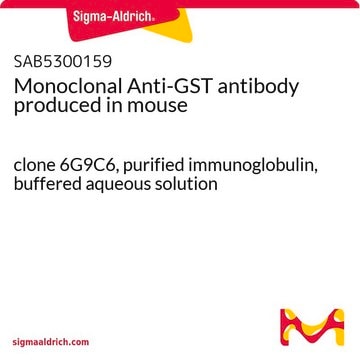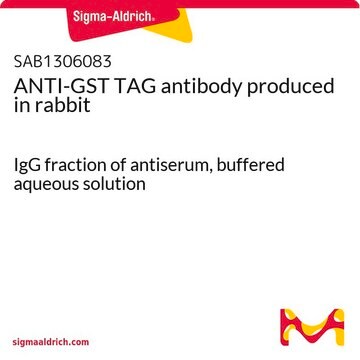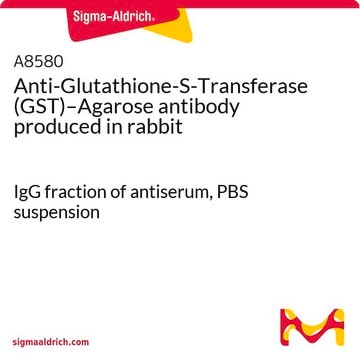Fontos dokumentumok
SAB4200237
Anti-Glutathione-S-transferase (GST) antibody, Mouse monoclonal
clone 2H3-D10, purified from hybridoma cell culture
Szinonimák:
Mouse Anti-GST Tag
About This Item
Javasolt termékek
biológiai forrás
mouse
Minőségi szint
konjugátum
unconjugated
antitest forma
purified immunoglobulin
antitest terméktípus
primary antibodies
klón
2H3-D10, monoclonal
form
buffered aqueous solution
koncentráció
~1.0 mg/mL
technika/technikák
western blot: 0.2-0.4 μg/mL using detection limit for GST-fustion protein is ∼ 10ng/lane
kiszállítva
dry ice
tárolási hőmérséklet
−20°C
célzott transzláció utáni módosítás
unmodified
Általános leírás
Egyediség
Immunogen
Alkalmazás
Biokémiai/fiziológiai hatások
Fizikai forma
Tárolás és stabilitás
Jogi nyilatkozat
Nem találja a megfelelő terméket?
Próbálja ki a Termékválasztó eszköz. eszközt
javasolt
Tárolási osztály kódja
10 - Combustible liquids
Lobbanási pont (F)
Not applicable
Lobbanási pont (C)
Not applicable
Analitikai tanúsítványok (COA)
Analitikai tanúsítványok (COA) keresése a termék sarzs-/tételszámának megadásával. A sarzs- és tételszámok a termék címkéjén találhatók, a „Lot” vagy „Batch” szavak után.
Már rendelkezik ezzel a termékkel?
Az Ön által nemrégiben megvásárolt termékekre vonatkozó dokumentumokat a Dokumentumtárban találja.
Az ügyfelek ezeket is megtekintették
Tudóscsoportunk valamennyi kutatási területen rendelkezik tapasztalattal, beleértve az élettudományt, az anyagtudományt, a kémiai szintézist, a kromatográfiát, az analitikát és még sok más területet.
Lépjen kapcsolatba a szaktanácsadással












